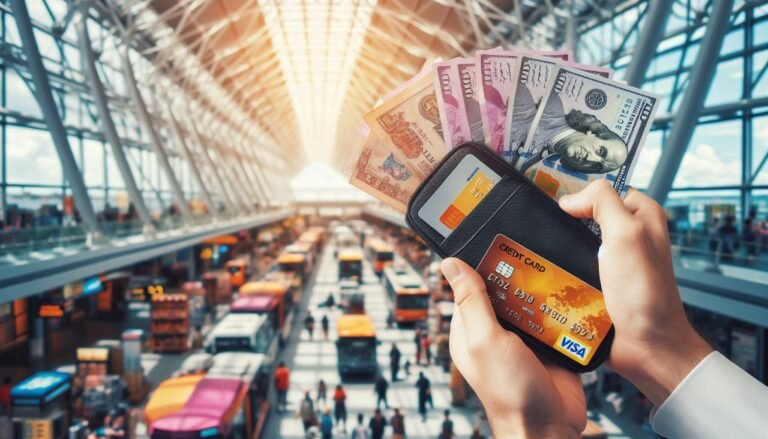The Impact of Inflation on Currency Value: What It Means for Your Money
Inflation affects nearly every aspect of the economy, from the price of groceries to the value of your savings. But one of the most significant and often overlooked effects of inflation is its impact on currency value.
When inflation rises, currencies lose purchasing power, which can influence everything from travel costs to international trade and investments. Whether you’re a traveler, investor, or business owner, understanding how inflation impacts exchange rates can help you protect your money and make smarter financial decisions.
In this article, we’ll break down what inflation is, how it affects currency value, and what you can do to mitigate its impact on your finances.
What is Inflation?
Inflation refers to the rate at which prices of goods and services rise over time. It’s usually measured as a percentage increase in the Consumer Price Index (CPI), which tracks the average cost of a basket of consumer goods.
When inflation is low and stable, it’s considered a normal part of a growing economy. However, when inflation is too high or unpredictable, it erodes the value of money and can lead to serious economic issues.
Example:
If inflation is 5% per year, something that costs $100 today will cost $105 next year. If your income or savings don’t grow at the same rate, your purchasing power decreases.
How Inflation Affects Currency Value
Currencies are affected by inflation in several ways, particularly in relation to exchange rates, international trade, and investment flows.
1. Currency Depreciation: The Silent Wealth Erosion
When inflation rises in a country, the value of its currency usually declines compared to other currencies.
This is because:
- Higher inflation reduces purchasing power, making the currency less attractive.
- Investors seek currencies with stable value, causing capital to flow elsewhere.
- Central banks may print more money, further weakening the currency.
Example:
If inflation in the U.S. rises while inflation in the Eurozone remains low, the U.S. dollar (USD) may weaken against the euro (EUR), making European goods more expensive for Americans.
2. Central Bank Responses and Interest Rates
Central banks adjust interest rates to control inflation. When inflation is high, they often raise interest rates to slow down spending and stabilize the economy.
Higher interest rates = Stronger currency
Lower interest rates = Weaker currency
- If a country raises interest rates, foreign investors are more likely to buy assets in that currency, increasing its demand and value.
- If a country lowers interest rates, its currency may weaken as investors seek higher returns elsewhere.
Example:
When the U.S. Federal Reserve increases interest rates, the dollar often strengthens, as global investors move their money into U.S. assets with better returns.
3. Inflation’s Effect on Imports and Exports
Inflation also affects trade and competitiveness:
- Countries with low inflation have stronger currencies, making their exports more expensive but more valuable.
- Countries with high inflation see their currency weaken, making exports cheaper and more attractive to foreign buyers.
Example:
If inflation in Japan remains low while inflation in the U.S. rises, the Japanese yen (JPY) may appreciate against the U.S. dollar, making Japanese products more expensive for Americans.
What Inflation Means for Your Money
Inflation impacts everyday financial decisions, from travel expenses to long-term savings. Here’s what it means for you:
1. Travelers: Higher Costs in Foreign Currencies
If inflation is high in your home country and your currency weakens, traveling abroad becomes more expensive because your money doesn’t go as far.
Tip: Exchange currency when your domestic currency is strong to get a better rate.
2. Investors: Market Volatility and Safe-Haven Currencies
Inflation uncertainty can cause market instability, leading investors to move money into safe-haven currencies like the Swiss franc (CHF) or U.S. dollar (USD).
Tip: Consider diversifying into gold, foreign currency investments, or inflation-protected securities.
3. Businesses: Impact on Pricing and Profit Margins
Companies that import goods from high-inflation countries may face higher costs and lower profits. Conversely, businesses that export to weaker-currency countries may benefit from increased demand.
Tip: Monitor exchange rate trends and use hedging strategies to reduce currency risk.
How to Protect Your Money from Inflation’s Impact on Currency
Since inflation affects currency values over time, here are some smart ways to minimize financial losses:
- Compare exchange rates before exchanging money – Use platforms like XE.com, Wise, or Google Exchange Rates to track real-time trends.
- Hold multiple currencies in a multi-currency account – Services like Revolut or Wise allow you to store money in different currencies and exchange at the best rates.
- Invest in assets that hedge against inflation – Consider gold, real estate, and foreign bonds as inflation-resistant investments.
- Time your foreign currency exchanges wisely – Exchange before inflation spikes or central bank decisions that could impact exchange rates.
- Use inflation-adjusted investments – Treasury Inflation-Protected Securities (TIPS) and forex trading strategies can help you stay ahead.
Final Thoughts
Inflation is an inevitable part of the economy, but its effects on currency can significantly impact your finances. Whether you’re planning international travel, investing in foreign markets, or managing a business, staying informed about inflation trends can help you make better financial decisions.







